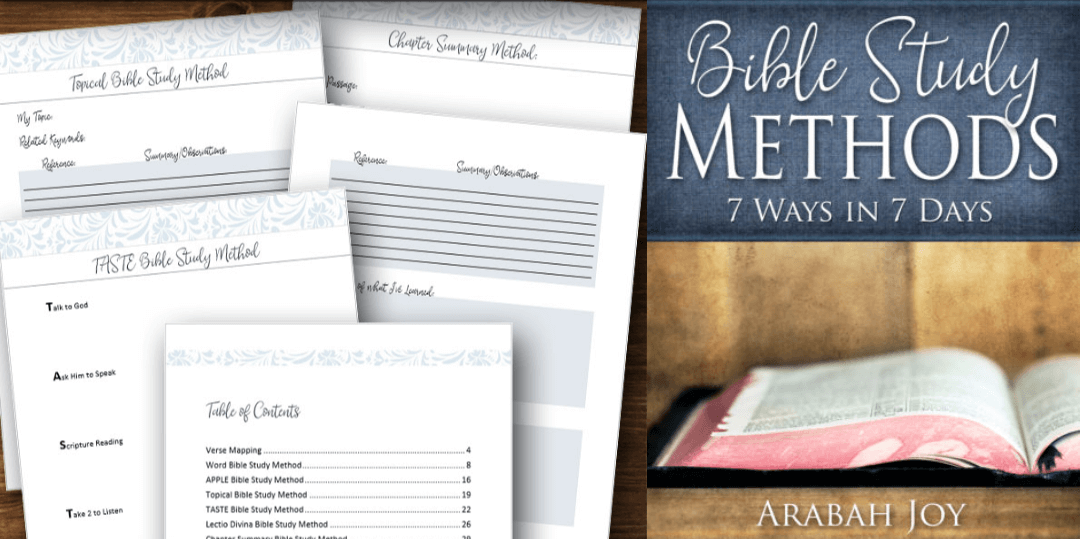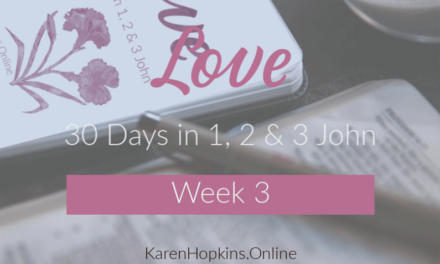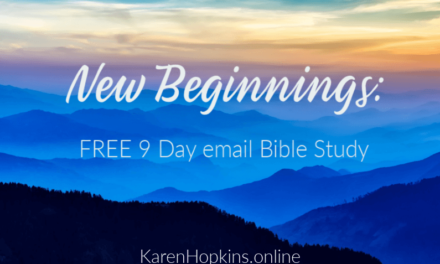When I was preparing my Scripture Plan Redeemed: 30 Days with the Israelite Slaves, I decided I wanted to look further into the theme of redemption and find out exactly what it meant. What does the word redeemed mean in a Biblical context? What does it mean to be redeemed? To find the answers to these questions I decided to do a topical Bible study on redemption. Writing a post on how to study the Bible by topic seemed like a good idea for my next Bible Study Method post too. So, today you have two for the price of one: step-by-step instructions for doing your own topical Bible study (including a free worksheet) and my findings from my redemption Bible study as an example!
This post contains affiliate links, which means that for each purchase made I receive a small contribution at no extra cost to you. For more information please see my policies page.
What is a topical Bible Study?
A topical bible study is a study of a specific topic or theme in the Bible. It is similar to a word study but broader, as you research a variety of words that connect to your topic and look at what the Bible has to say on your theme.
How do we do a thematic or topical Bible Study?
Let’s now walk through the steps of doing a topical Bible study. First, we need to collect our resources.
Resources you will need for a topical Bible Study
The first thing you will need if you want to do a topical Bible study is time! You’re going to be digging deep into some research so you might want to allocate a certain amount of time each day or each week for your study. Depending on how detailed you want to get will determine how much time you spend on your research.
The next resource you need is a good Study Bible. Start with a translation that is close to the original Greek and Hebrew meaning, like the ESV, NIV or NASB as you might miss some verses if you use a paraphrased version instead. I have recently downloaded the CSB Study Bible For Women to my kindle and am loving all the features! You could also use an online Bible like BibleGateway.com or blueletterbible.org
Your study Bible or online Bible will help you to look up words, but you might also want to lay your hands on a Concordance like the Strong’s Exhaustive Concordance of the Bible. This will help you to locate all references to a word or words in the Scriptures.
I always like to look up any word I’m studying in the dictionary to make sure I have the full understanding of the meaning of the word. Looking up the word or words in a Bible dictionary is also helpful so that you get a Biblical understanding. I found kingjamesbibledictionary.com very helpful as it gave me a number of definitions used in Bible dictionaries and a list of references.
Finally you need somewhere to record all your findings! This notebook from Amazon is ideal as it can be laid flat, has nice thick paper that doesn’t bleed, and has a Bible verse on each page.
Steps for studying the bible by topic
Now you have scheduled your study time and collected your resources it is time to start!
Step 1: Pray
Before starting any Bible reading it is always a good idea to pray. Ask God to speak to you through his word and give you wisdom to understand it. For ideas about praying during your Bible study time read my post 7 Bible Verses to Pray before reading the bible.
Step 2: Choose your theme or topic
A topic may have come up in your Bible Study or a sermon that you want to better understand. Or maybe there is a topic that is on your heart and you want to know what the Bible has to say about it. See this list of suggestions for a Topical Bible Study.
Step 3: Brainstorm
Before you dive into looking at your theme in different resources, have a think about your topic and write down any related words you might want to focus on. For my theme of redemption I’m also going to look up redeem, redeemed, and redeemer. If your topic is something that’s not specifically written about in the Bible, like racism, you might need to think of other words to look up.
At this stage it might also be good to come up with some sub-topics or questions you have on the topic. This will help you to stay on track with your research and group your findings.
Topical Bible Study Worksheet

Download the Topical Bible Study Worksheet
Step 4: Research
Now it is time to gather our resources and research our topic.
I like to start by looking up my topic in a dictionary and Bible dictionary. On the right you will see my research on the topic ‘redeemed’. Don’t forget to look up other variations of the word (like redeem, redemption).
Then look up the word, and the related words, in a concordance. Remember to look at each verse in context (reading the verses before and after) to make sure you have the full meaning. It is also wise to keep in mind the whole story of Scripture and the character of God to make sure that we are not ‘going off course’ in our findings. There may also be times that the word is used but it has a different meaning so you want to eliminate these verses from your study.
It may also be helpful to look up cross references or Scripture references from your Study Bible or commentary to find references to your topic that might not use your key word.
Openbible.info/topics is a great website to go to for verses for your topical bible study that might not use the exact word you are looking up. When I searched for my Redemption Bible study I got verses that used the words ‘bought’ and ‘ransomed’ instead, which added to my research and my understanding of the topic.
Finally, look up the theme of your Bible Study in a Bible Handbook or Study Bible. This will give you more insight into your topic and its Biblical connection.
REDEmption bible Study research
From the Collins dictionary I found the following definitions of redeem which were relevant to my study: to cancel a debt by paying money that you owe or that you promised to pay; to buy back something that belonged to you by repaying money you borrowed; to save someone by freeing them from sin and evil.
From kingjamesbibledictionary.com I added the following definitions: to ransom, to purchase back, to rescue from captivity or bondage, to save, to pay the penalty of.
Using my study Bible, online Bibles and concordance I found the following Bible references about redemption to be helpful:
Exodus 6:6 “I will redeem you with an outstretched arm.”
Psalm 130:7-8 “Israel, put your hope in the Lord, for with the Lord is unfailing love and with him is full redemption. He himself will redeem Israel from all their sins.”
Isaiah 43:1 says “I have redeemed you; I have summoned you by name; you are mine.”
Luke 1:68 (Zechariah’s prophecy) God “has come to his people and redeemed them”.
Gal 3:13; Eph 1:7; Col 1:13-14 and Titus 2:14 speak of Jesus Christ redeeming sinners.
I also found verses that used the words ‘bought’ and ‘ransomed’ instead: 1 Peter 1:18-19; 1 Cor 6:20, 7:23; Rev 5:9
Step 5: Ask questions
How do the different verses I’ve studied connect?
How do they compare?
What is the overall message about my topic?
Are there any contradictions?
Is there some kind of progression?
Is the concept of the theme different in the Old and New Testament?
What understanding would the people in the Biblical accounts, and the original readers, have about this topic?
How does this differ from an understanding today?
Questions from Redemption Bible Study Research
The first mention of redemption is in Exodus 6:6 when God speaks to Moses about the Israelites. God says he will bring them out, free them, and redeem them – so redemption is more than just setting free.
In Psalm 130 we see that the concept of redemption continues to apply to all Israel. God redeems them from their sins, not just from being slaves in Egypt.
Leviticus and Ruth also make reference to redemption from a legal perspective. How does this illustrate the concept of a spiritual redemption? What does this teach me about the original readers’ understanding of redemption?
The whole of Isaiah 43 speaks of redemption, and Isaiah often refers to God as our redeemer.
In the New Testament Christ is the redeemer.
Step 6: Put it all together
Once you have completed your research and reflected on your discoveries it is time to review the verses and your notes. It is time to draw your conclusions.
Here are a few more questions to ask yourself as you look at what you have pulled together:
- How has what I have discovered changed or reinforced my understanding of the topic?
- What do I learn about God from studying this topic?
- How should I respond to God?
- How should I respond in my actions?
Now write a summary of your findings and any application.
Summary of Redemption Bible Study
In the Old Testament accounts in Exodus and Isaiah God gives us a picture of his plan for redemption. From the Old Testament we see that the Jews saw God as their redeemer. But the New Testament declares that Christ has come as the redeemer of all (Rev 5:9). He paid the price with his blood (Gal 3:13; 1 Peter 1:19; Revelations 5:9) and rescued us from ‘the empty ways of life’ (1 Peter 1:18), darkness (Col 1:13) and wickedness (Titus 2:14); forgiving our sins (Eph 1:7) and reinstating us as God’s children (Galatians 4:5; Titus 2:14).
Therefore, we should be eager to do what is good (Titus 2:14); honour God with our bodies (1 Cor 6:20); and not become slaves to people (1 Cor 7:23).
Step 7: Pray
Our final step is to return to God in prayer. Thank God for what you have learned and ask him to guide you and help you through any application.












It’s so crazy that you chose redemption because I have been wanting to do a study on that for quite awhile! Do you know of any online concordances…that are free to use?
Hi Melissa. I usually use biblegateway.com or blueletterbible.org to search for words. Blueletterbible is great for looking up words in the original language.
Thanks for sharing. I am so glad that I was taught how to study the Bible when I attended Bible College years ago. It has helped me so much in my Christian Walk. Each one of us needs to heed 2 Timothy 2:15 in order to become grounded in the Truth.
Thanks, Ellen. I was really blessed by my time at Bible College too. My aim with this website is to pass that knowledge on to all women. It is important for all of us to read the Bible effectively!